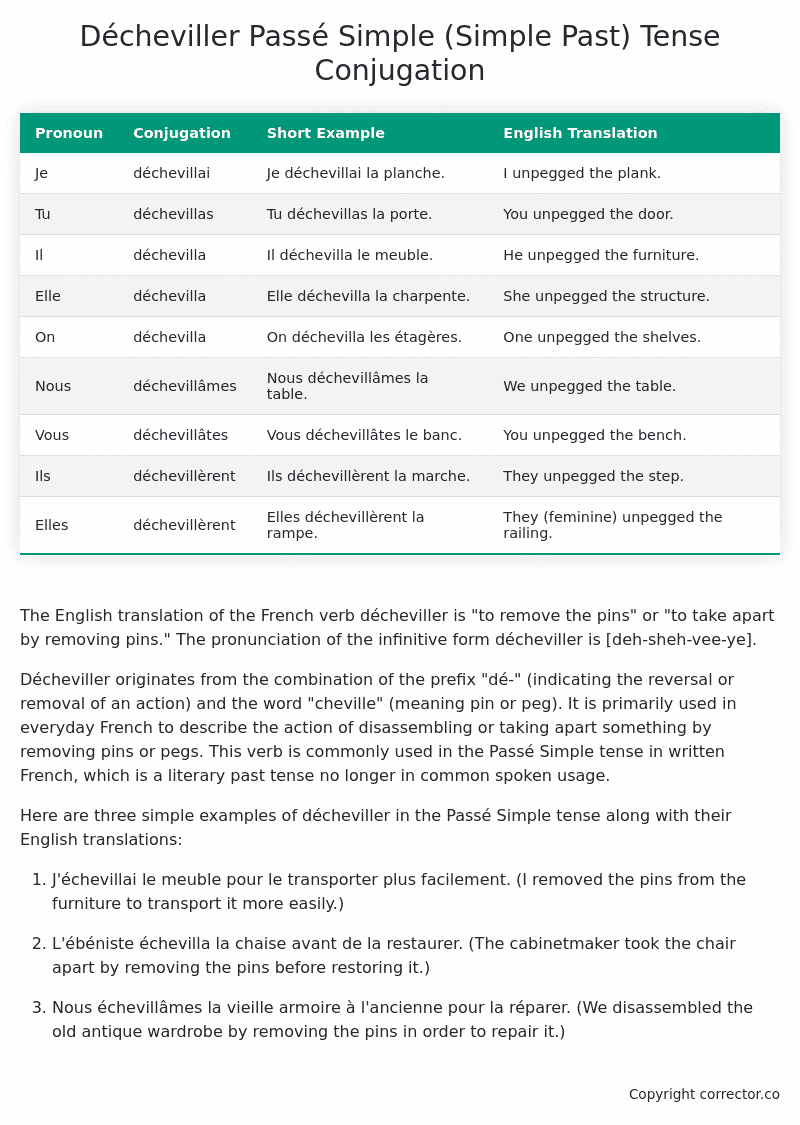Passé Simple (Simple Past) Tense Conjugation of the French Verb décheviller
Introduction to the verb décheviller
The English translation of the French verb décheviller is “to remove the pins” or “to take apart by removing pins.” The pronunciation of the infinitive form décheviller is [deh-sheh-vee-ye].
Décheviller originates from the combination of the prefix “dé-” (indicating the reversal or removal of an action) and the word “cheville” (meaning pin or peg). It is primarily used in everyday French to describe the action of disassembling or taking apart something by removing pins or pegs. This verb is commonly used in the Passé Simple tense in written French, which is a literary past tense no longer in common spoken usage.
Here are three simple examples of décheviller in the Passé Simple tense along with their English translations:
-
J’échevillai le meuble pour le transporter plus facilement.
(I removed the pins from the furniture to transport it more easily.) -
L’ébéniste échevilla la chaise avant de la restaurer.
(The cabinetmaker took the chair apart by removing the pins before restoring it.) -
Nous échevillâmes la vieille armoire à l’ancienne pour la réparer.
(We disassembled the old antique wardrobe by removing the pins in order to repair it.)
Table of the Passé Simple (Simple Past) Tense Conjugation of décheviller
| Pronoun | Conjugation | Short Example | English Translation |
|---|---|---|---|
| Je | déchevillai | Je déchevillai la planche. | I unpegged the plank. |
| Tu | déchevillas | Tu déchevillas la porte. | You unpegged the door. |
| Il | déchevilla | Il déchevilla le meuble. | He unpegged the furniture. |
| Elle | déchevilla | Elle déchevilla la charpente. | She unpegged the structure. |
| On | déchevilla | On déchevilla les étagères. | One unpegged the shelves. |
| Nous | déchevillâmes | Nous déchevillâmes la table. | We unpegged the table. |
| Vous | déchevillâtes | Vous déchevillâtes le banc. | You unpegged the bench. |
| Ils | déchevillèrent | Ils déchevillèrent la marche. | They unpegged the step. |
| Elles | déchevillèrent | Elles déchevillèrent la rampe. | They (feminine) unpegged the railing. |
Other Conjugations for Décheviller.
Le Present (Present Tense) Conjugation of the French Verb décheviller
Imparfait (Imperfect) Tense Conjugation of the French Verb décheviller
Passé Simple (Simple Past) Tense Conjugation of the French Verb décheviller (You’re reading it right now!)
Passé Composé (Present Perfect) Tense Conjugation of the French Verb décheviller
Futur Simple (Simple Future) Tense Conjugation of the French Verb décheviller
Futur Proche (Near Future) Tense Conjugation of the French Verb décheviller
Plus-que-parfait (Pluperfect) Tense Conjugation of the French Verb décheviller
Passé Antérieur (Past Anterior) Tense Conjugation of the French Verb décheviller
Futur Antérieur (Future Anterior) Tense Conjugation of the French Verb décheviller
Subjonctif Présent (Subjunctive Present) Tense Conjugation of the French Verb décheviller
Subjonctif Passé (Subjunctive Past) Tense Conjugation of the French Verb décheviller
Subjonctif Imparfait (Subjunctive Imperfect) Tense Conjugation of the French Verb décheviller
Conditionnel Présent (Conditional Present) Tense Conjugation of the French Verb décheviller
Conditionnel Passé (Conditional Past) Tense Conjugation of the French Verb décheviller
Conditionnel Passé II (Conditional Past II) Tense Conjugation of the French Verb décheviller
L’impératif Présent (Imperative Present) Tense Conjugation of the French Verb décheviller
L’impératif Passé (Imperative Past) Tense Conjugation of the French Verb décheviller
L’infinitif Présent (Infinitive Present) Tense Conjugation of the French Verb décheviller
L’infinitif Passé (Infinitive Past) Tense Conjugation of the French Verb décheviller
Le Participe Présent (Present Participle) Tense Conjugation of the French Verb décheviller
Le Participe Passé (Past Participle) Tense Conjugation of the French Verb décheviller
Struggling with French verbs or the language in general? Why not use our free French Grammar Checker – no registration required!
Get a FREE Download Study Sheet of this Conjugation 🔥
Simply right click the image below, click “save image” and get your free reference for the décheviller Passé Simple tense conjugation!

Décheviller – About the French Passé Simple (Simple Past) Tense
Formation
Usage
Narration
Historical Context
Interactions with other tenses
Passé Composé
Imparfait
Conditional and Subjunctive
Summary
I hope you enjoyed this article on the verb décheviller. Still in a learning mood? Check out another TOTALLY random French verb conjugation!


